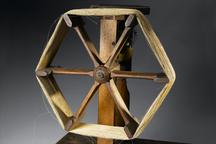

Sir Richard Arkwright 1732 - 1792
- occupation:
- Inventor,
- Manufacturer
- Nationality:
- English; British
- born in:
- Preston, Lancashire, England, United Kingdom
British inventor and cotton manufacturer.
1768 - formed a partnership with Smalley and Thornley to exploit new spinning machine;
1769 - petition granted for spinning machine; started a factory at Nottingham;
1773 - manufactured calicos;
1775 - successfully applied for a patent for certain instruments and machines for preparing silk, cotton, flax, and wool, for spinning;
1786 - knighted;
1791 - campaigned to end the East India Company's monopoly
Arkwright, the thirteenth child in a poor Preston family, began life as a barber. Prior to his experiments in spinning he had some success through an invention for dyeing hair aimed at the wig trade.
When his first wife died, he married a woman from Leigh, a spinning town, in 1761, and it is said that this association first turned his thoughts to the spinning industry. Unfortunately Mrs Arkwright was less than pleased with his obsessive interest - at one point she destroyed his models in a vain attempt to return him to hairdressing. He persevered however and in 1769 took out a patent for his spinning machine.
The immense profitability of the design attracted numerous imitators, and patent disputes eventually led to trials in which Arkwright's claims of invention were disputed. Nevertheless the perfected machine - performing everything from the carding to the spinning (effected by rollers) of the cotton - was by and large Arkwright's invention, and one which marked the start of the golden age of the British cotton industry.
Arkwright set up various mills, becoming immensely wealthy despite the retraction of his patents towards the end of his life. Before his death in 1792 he was made sheriff of Derbyshire. He was more of an improver of other people’s ideas than an inventor and his greatest talent lay in his business skills. This allowed him to amass great wealth, some of which he reinvested in his business. He enjoyed an opulent lifestyle, was knighted in 1786 and served as the High Sheriff of Derbyshire. At the time of his death in 1792, he was one of the wealthiest men in England, leaving £500,000 (£28 million at 2011 values).








